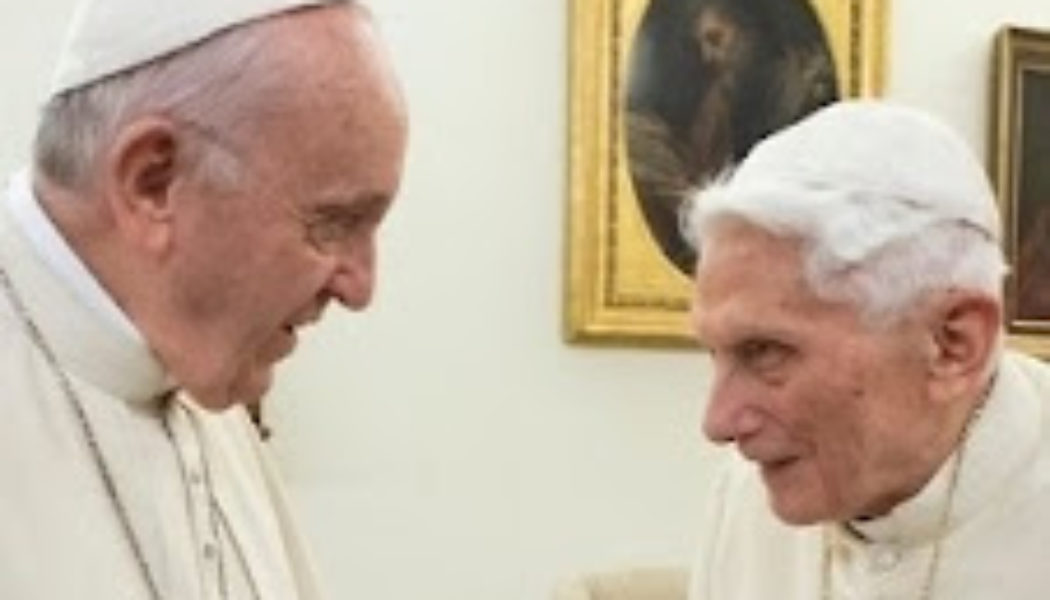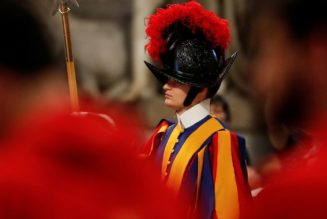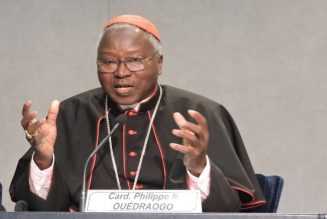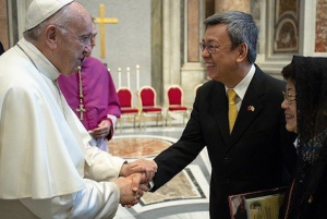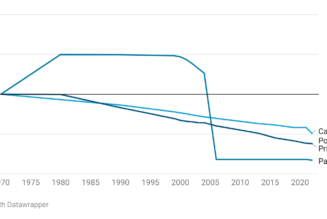In his book The
Plato Cult and Other Philosophical Follies, David Stove observes
that an argument once given by philosopher of science Imré Lakatos “manages to
be scandalous and pointless at the same time” (p. 8). He was referring to Lakatos’s having made use
of certain historical examples, some of the details of which Lakatos admitted
he had made up himself. The idea is
that, as bad as dishonest scholarship is, worse still is defeating the whole
purpose by admitting that that is what you are doing. I put aside for present purposes the question
of whether Stove’s characterization of Lakatos was actually fair. What I’m interested in here is the general
idea of a position that is simultaneously scandalous and pointless.
I can’t help
but think of Stove’s remark when I consider the growing fad in some
conservative Catholic circles for “Benevacantism” – the theory that Benedict
XVI is still pope, so that Francis is an antipope. (The word is a portmanteau derived from
“Benedict” and “sedevacantism.” Which doesn’t
really make much sense, given that the view does not claim that there is
currently no pope, as sedevacantism does.
Some people prefer other labels, such as “resignationism” or
“Beneplenism,” for reasons you can google if you’d like.)
You might
think the view too silly to be worth commenting on. But there are two reasons for doing so,
namely that it is scandalous and that it is pointless. It is scandalous insofar as those promoting
it are leading Catholics into the grave sin of schism, i.e. refusing due
submission to the Roman Pontiff, who (like it or not) is in fact Francis. And while it is the view of only a small
minority, some of them are influential. I
make no judgment here about the culpability of those drawn to this error, many
of whom are well-meaning people understandably troubled by the state of the
Church and the world. But that it is an error, there can be no reasonable
doubt.
That brings
me to the other reason for commenting on Benevacantism, which is that it is
pointless. In particular, the view is
incoherent, and indeed self-defeating, but in a way that seems to me to be
philosophically interesting. To see how,
let’s begin by calling to mind the motivation
people have for wanting Benevacantism to be true (as contrasted with the arguments they give for it – I’ll come
to those in a moment).
It is not
news that Pope Francis has, over the years, made a number of theologically
problematic statements (about Holy Communion for those living in adulterous
relationships, capital punishment, and other matters) and done a number of
problematic things (such as reversing Benedict’s motu proprio on the Latin Mass).
I’ve addressed these controversies many times before and am not going to
rehash it all here. The point to
emphasize for present purposes is that Benevacantists suppose that the problem
posed by Francis’s questionable statements and actions can be dissolved if it
were to turn out that Benedict is still pope.
For in that case, the problematic statements were not made by a true
pope, so that there is no need to explain how
a pope could commit such errors.
Now, one
problem here is that this “solution” is simply unnecessary. The Church has always acknowledged that popes
can err when not speaking ex cathedra,
and whatever else one thinks of Francis’s controversial statements and actions,
they all would, if erroneous, fall into the category of possible papal
error. Francis may have said and done more theologically dubious things than
the best-known popes of the past who have done so (such as Honorius and John
XXII), but they are dubious statements and actions of the same basic kind. The problem is extremely serious, but again, it’s
within the boundaries of what the Church and her faithful theologians have
always acknowledged could happen, consistent with the clearly defined
conditions for papal teaching being infallible.
(I’ve addressed this issue in detail elsewhere, such as here
and here.)
But that’s
not primarily what I’m talking about when I say that Benevacantism is
pointless. To understand that we need to
understand the arguments for the view.
In 2016, Archbishop Georg Gänswein, personal secretary to Benedict XVI,
gave a now-famous speech wherein
he said that the pope’s resignation had created an “expanded”
Petrine office with two members, an “active” one and a “contemplative”
one. The Petrine “munus” – which can mean “ministry” or “service, duty, guide or
gift” – is, the archbishop said, therefore something Benedict still
participates in even after resigning. Indeed,
his acceptance of the office of the papacy in 2005 was “irrevocable.” This, Gänswein said, is why it is appropriate
that he retains his papal name, still wears papal white garments, and remains
within the Vatican.
Given how
close Gänswein is to Benedict, these remarks were widely understood to reflect
the Pope Emeritus’s own views. And it is
completely unsurprising that they raised everyone’s eyebrows – and, as it
happens, a few people’s hopes. For they seem to imply that, despite his
resignation, Benedict may in some sense think of himself as still holding the
papal office, at least in part. And this
has given rise to at least two different versions of Benevacantism, which rest
on two different theories about how the views conveyed by Gänswein purportedly
cast doubt on the validity of Benedict’s resignation. They go as follows:
Theory 1: Benedict didn’t really
intend to resign. According to this theory, Benedict
distinguishes the munus of the papacy
(in the sense of the office itself and its duties), from the ministerium or actual exercise of the powers
of the office. What Benedict renounced,
according to this theory, is only the latter and not the former. That is to say, he retains the munus of the papacy, but decided to turn
the ministerium over to another, who
ended up being Francis. Francis, for
this reason, is said by Gänswein to be the “active” member of this expanded
papal office. But Benedict, who now
retains only a “contemplative” role, is still the one who in the strict sense
holds the munus and thus the papacy.
Theory 2: Benedict did intend to
resign, but failed. According to this alternative theory,
Benedict did indeed intend flatly to resign the papacy. But since he holds the views reported by Gänswein,
he did not succeed in validly doing so.
The reason is that the functions of the papal office simply cannot be
divided in the way Benedict, according to the theory, supposes they can
be. Hence his resignation was predicated
on a false understanding of what he was doing, and that invalidates it. He is therefore still pope.
Now, I don’t
think either of these theories is plausible for a moment. But let’s pretend they were. Would they solve the problem they are
intended to solve – that is to say, the problem of having to deal with a
genuine pope who says and does theologically highly problematic things? Not in the least, which is why I say
Benevacantism is pointless.
Suppose
theory 1 were true. Then Francis would
be something like Benedict’s viceroy, acting on his behalf and with his
authority. His words and actions would
have whatever authority they had precisely insofar as he acts in Benedict’s
name, and in effect would therefore be Benedict’s
words and actions, especially if Benedict did nothing to correct them. (Call to mind here Aquinas’s teaching in Summa Theologiae II-II.182
that the active life “serves rather than commands” the contemplative, which is
superior to it. Hence, if the papacy
really were divided into “contemplative” and “active” members, the latter would
be the instrument of the former.)
Surely the difficulty
here is obvious. It would follow that
Francis’s problematic words and actions too would, in effect, be Benedict’s problematic words and actions. Hence this first version of Benevacantism
would do nothing at all to solve the problem of how a pope could say and do the
problematic things Francis has done. It
would merely relocate responsibility for these problematic words and actions
from Francis to Benedict. Indeed, it
would make the situation worse, because you would not only have a pope who is
ultimately responsible for the problematic words and actions in question, but one
who also, on top of that, allows the faithful to be confused about who exactly the pope really is. Benevacantists think of Benedict as a better
pope than Francis, but in fact this first version of their theory would entail
that he is a worse pope.
Suppose
instead we went with theory 2. This is
hardly better; indeed, it may even be worse still. For one thing, on this scenario too, Benedict
does not turn out to be a better defender of orthodoxy than Francis is. Rather, the theory would make him out to be
such an incompetent and unreliable defender of orthodoxy that he would not even understand the nature of
the papacy itself, which is supposed
to be the ultimate bulwark of orthodoxy.
Indeed, he would be so incompetent and unreliable that he would not even
know who the pope really is, and that it is precisely he himself who is still pope.
He would, in effect, be in schism
from himself, and guilty of subordinating
himself and the rest of the faithful to an antipope!
This would be a superior guardian of
orthodoxy than Francis? Seriously?
But it gets
worse. Suppose one of these two versions
of Benevacantism were true. What is the
Church supposed to do? Presumably, on
the best case scenario, Benedict himself would publicly endorse some version of
the theory. But that would be a
disaster. If he endorsed theory 1, he
would in effect be saying that he has silently allowed the Church to be gravely
misled and misgoverned for almost a decade – that he has been pope all along
but has failed to carry out his duties as pope, and done so on the basis of a
novel theological theory that has no ground or precedent in the historical
teaching of the Church. Why, in that
case, should any Catholic trust him or his magisterium ever again? And of course, millions of Catholics would not trust him, nor would they accept
this shocking claim, and would continue to recognize Francis as pope. This would entail a schism unprecedented in
Church history, with no clear means of resolution.
Suppose
instead that Benedict came to endorse theory 2, and made an announcement to
that effect: “Hey, listen up everyone, it turns out I am still pope after all! No
one is more surprised about this than I am, but there it is. I hereby immediately resume my duties and
command Francis to step aside.” Why
should anyone regard this judgment as
any more sound than the earlier judgment he made to the effect that he was no
longer pope? In which case, again, why
should any Catholic ever trust him or his magisterium again? And here too, millions of Catholics would not
accept this announcement, but would judge that he had gone crazy and continue
to follow Francis. Again, we’d be stuck
with an unprecedented and irresolvable schism.
Or suppose –
as, it goes without saying, is the far more likely scenario – that Benedict
goes to his grave without endorsing any version of Benevacantism. What then?
If he dies before Francis, how are we ever supposed to get a validly
elected pope ever again, given that so many of the current cardinals have been
appointed by Francis, whom Benevacantists claim to be an antipope? We would be stuck with all the problems
facing sedevacantism. And things would
hardly be any better if Francis dies before Benedict while Benedict continues
to maintain that he is no longer pope.
To call Benevacantism
half-baked would be too generous. It is
a complete theological mess. It offers
no solution whatsoever to the problems posed by Pope Francis’s controversial
words and actions, and in fact makes things much worse. And on top of that it leads Catholics into
the grave sin of schism. Hence, as I
say, it is both scandalous and pointless at the same time.
It is also a
non-starter even apart from all that, because there can be no reasonable doubt
that Benedict validly resigned. Canon
332 §2 of the Code of Canon Law tells us:
If it happens that the Roman Pontiff
resigns his office, it is required for validity that the resignation is made
freely and properly manifested but not that it is accepted by anyone.
Now,
Benedict publicly and freely resigned his office, and has publicly
reaffirmed that his decision was taken freely, in answer to those
who have speculated otherwise. He has
also explicitly
acknowledged that there is only one pope and that it is
Francis. His resignation thus clearly
meets the criteria for validity set out by canon law. End of story.
Some have
suggested that the resignation cannot have been made freely because, they say,
it was done under the influence of an erroneous theory of the papacy, namely
the one described by Gänswein. But this
is a non sequitur, as any Catholic
should know who is familiar with the conditions for a sin to be mortal – grave
matter, full knowledge, and deliberate consent. My point isn’t that Benedict’s resignation
was sinful, but rather that these conditions illustrate the general point that
the Church distinguishes acting with full
knowledge and acting with deliberate
consent or freely. And canon law
makes only the latter, and not the former, a condition for the validity of a
papal resignation. Hence, even if
Benedict’s resignation was made under the influence of an erroneous theological
theory about the papacy, that would be irrelevant to its having been made
freely and thus validly.
Some will
nevertheless insist that Benedict did not act freely, because they speculate
that he was being blackmailed or otherwise acting in fear. But he has publicly denied this, and after
nine years no one has offered any evidence that it is true. Note also that canon law says that it is not
necessary that a resignation be “accepted by anyone” in order for it to be
valid. Hence neither Benedict nor anyone
else is under any obligation to prove to
the satisfaction of Benevacantists that his resignation was valid in order
for it actually to be valid.
But what
about the views reported by Gänswein? If
they really are Benedict’s, don’t they cast at least some doubt on his resignation?
No, not at all. They are merely the
personal opinions of a man who is now just a private theologian, who apparently
believes that his novel office of “Pope Emeritus” is in some respects analogous
to, and even inherits some of the dignity and functions of, the separate office of the papacy – an
office he no longer holds, and which he has acknowledged he no longer
holds. One might accept his theory about
the nature of the office of “Pope Emeritus” or reject it, but that is
irrelevant to whether Benedict validly resigned. And it remains irrelevant even if Benedict
believed this theory prior to resigning, for then too it would have been
nothing more than Benedict’s private theological opinion rather than an
official teaching of the Church.
Francis, and Francis alone, is the
pope. You may lament this, but it is reality. And the first step in dealing with some
reality you don’t like is to face it, rather than retreating into fantasy.
Join Our Telegram Group : Salvation & Prosperity
